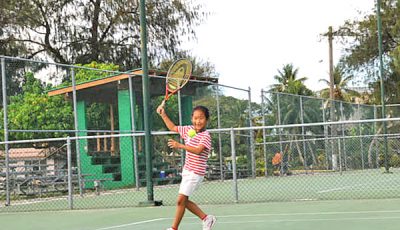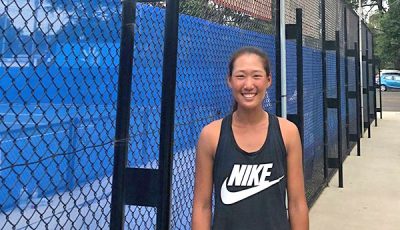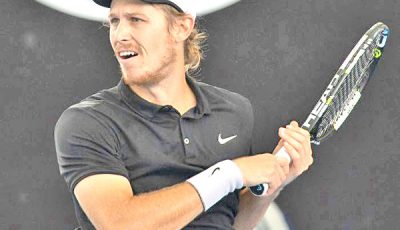Djokovic beats Federer in US Open finals
NEW YORK (AP)—After winning a point in the U.S. Open final, and bent on proving a point, Novak Djokovic leaped and roared and threw an uppercut, then glared at some of the thousands of spectators pulling for Roger Federer.
Following another point in that game, Djokovic nodded as he smiled toward the stands. And moments later, Djokovic shook his right arm, bloodied by an early fall, and screamed, “Yes! Yes!” to celebrate a missed forehand by Federer.
Djokovic appeared to be all alone out there in Arthur Ashe Stadium, trying to solve Federer while also dealing with a crowd loudly supporting the 17-time major champion proclaimed “arguably the greatest player in the history of the sport” during prematch introductions.
In the end, Djokovic handled everything in a thrill-a-minute final on a frenetic night. Thwarting Federer with his relentless defense and unparalleled returning, Djokovic took control late and held on for a 6-4, 5-7, 6-4, 6-4 victory Sunday to earn his second U.S. Open title, third major championship of the year and 10th Grand Slam trophy in all.
“We pushed each other to the limit,” the No. 1-ranked Djokovic said, “as we always do.”
Djokovic, who is 63-5 in 2015, including 27-1 at majors, said he understood why the crowd backed Federer but hopes to someday get that sort of support.
“You do let sometimes certain things to distract you,” Djokovic said about interacting with the fans. “But it’s important to get back on the course and go back to basics and why you are there and what you need to do.”
Certainly was able to do that.
Contorting his body this way and that, sneakers squeaking loudly as he changed directions or scraping like sandpaper as he slid to reach unreachable shots, Djokovic forced the 34-year-old Federer to put the ball into the tiniest of spaces. Federer wound up with 54 unforced errors, 17 more than Djokovic.
Another key statistic: Djokovic won 10 of the first 12 points that lasted at least 10 strokes.
Perhaps the most pivotal of all: Djokovic saved 19 of the 23 break points he faced, while winning six of Federer’s service games.
“Some of them, I could have done better, should have done better,” the second-ranked Federer said.
From late in the third set to 5-2 in the fourth, Djokovic took control against a wilting Federer by claiming eight of 10 games. Federer made one last stand, breaking to get within 5-3 and holding for 5-4, but a forehand return that flew long left Djokovic as the champion, pointing to his heart.
After all the attention paid to Serena Williams’ bid for the first calendar-year Grand Slam, which ended with a semifinal loss at the U.S. Open, it’s Djokovic who reached all four finals. He beat Andy Murray at the Australian Open in January, lost to Stan Wawrinka at the French Open in June, then beat Federer at Wimbledon in July.
The 28-year-old from Serbia also won a trio of majors in 2011—including his only other title in New York in five previous finals—and his career total ranks tied for seventh-most in history behind Federer.
Djokovic evened his head-to-head record with Federer at 21-all. They have met in three of the last six Grand Slam finals, and Djokovic is 3-0 in those. It is as spectacular a rivalry as there is in tennis right now, with contrasting styles of play.
“Being back in a final is where you want to be,” said Federer, who owns five U.S. Open titles but last played for the championship in 2009. “Playing a great champion like Novak is a massive challenge.”
His coach, Stefan Edberg, figures an 18th major title is still not out of reach, even though no one Federer’s age has won the U.S. Open since 1970.
“You still cannot count him out,” Edberg said. “If he keeps playing at this level, he’ll get another shot.”
Djokovic sounded as if he agreed, saying about Federer: “He’s just not going away.”
Rain began falling about 10 minutes before they were supposed to head out from the locker room, and the start of the match was delayed for more than three hours, beginning after 7 p.m. Won’t happen again: The U.S. Tennis Association is in the midst of constructing a retractable roof expected to be ready for next year’s tournament.
In the third game, Djokovic slipped as he raced forward and fell, ripping skin off his hand, elbow and knee. Shaken, he lost six of the next seven points, then got treatment from a trainer.
Still, all of four Federer service games into the match, Djokovic earned four breaks. That was the same total managed by Federer’s opponents in 82 service games across his previous six matches. Federer also hadn’t lost a set until Sunday.
If there were many folks in favor of Djokovic in the 23,771-capacity arena, they were tough to hear. Instead—and make no mistake, Djokovic noticed—a vast majority were on Federer’s side, even applauding faults by Djokovic, considered poor tennis etiquette. Over and over, chair umpire Eva Asderaki-Moore, the first woman to officiate a U.S. Open men’s singles final, held up a hand the way a school teacher might and asked for quiet.
“Was it louder than ever? Maybe,” Federer said. “It was unreal.”
Pennetta wins 1st Grand Slam
In New York, even Flavia Pennetta was a tiny bit disappointed that Serena Williams didn’t complete the first Grand Slam since 1988 at the U.S. Open.
“Of course,” she said hours after she won her first major title in her final chance before retiring—well aware that had Williams accomplished the feat, it would’ve meant no championship for Pennetta.
She was thrilled for childhood friend Roberta Vinci for her upset of Williams in Friday’s semifinals, but Pennetta was like any other tennis fan captivated by the chance to witness a rare achievement.
“Also, I was thinking it was going to be nice to be on court with her, and maybe lose, but for a moment so special for everyone, for her, for history,” she said.
Not that Pennetta intended to lose when she thought for a few hours that her opponent in the final might be the 21-time major champion. Asked about the potential matchup after her semifinal win Friday, Pennetta said with a wry smile: “It’s going to be amazing for her to do something like that, and it’s going to be amazing for me to win this tournament.”
She also warned reporters not to count out Vinci, even though her fellow Italian was down a set at the time.
Vinci’s victory set off a whole different kind of stress for Pennetta. Suddenly she was the favorite in her first Grand Slam final.
“It was: Now I have more of a chance,” Pennetta said Saturday. “But on the other side, I tried not to put in my mind that I HAD to win. I had an upset stomach. I even cried. There was an accumulation of emotion.”
She controlled those emotions after a shaky start to beat Vinci in straight sets. Then with her post-match interview about to end, she interjected that she had one more thing to say: Pennetta was retiring.
It was a stunning announcement but not a rash decision to go out on top—she had resolved a month earlier to step away from the game at the end of the season.
The 33-year-old was OK that her career was going to end without a major title. Her trainer asked before the U.S. Open if she thought she could still win a Grand Slam championship and Pennetta said no.
“Now they’re laughing so much,” Pennetta said Saturday about her team.
They’ve been teasing her: “You have a double personality for sure.”
Her fiance, fellow player Fabio Fognini, said he thought she should stay on tour but respected her decision.
“She’s hard-headed, very determined in anything she does,” he said.
Fognini, who lost in the fourth round last Sunday, flew back from Italy on Saturday morning to attend the final. He bit his fingernails in the stands at Arthur Ashe Stadium, a nervous spectator in the same venue where he thrilled fans eight days earlier in the most captivating match of this year’s U.S. Open before Vinci’s upset of Williams.


























